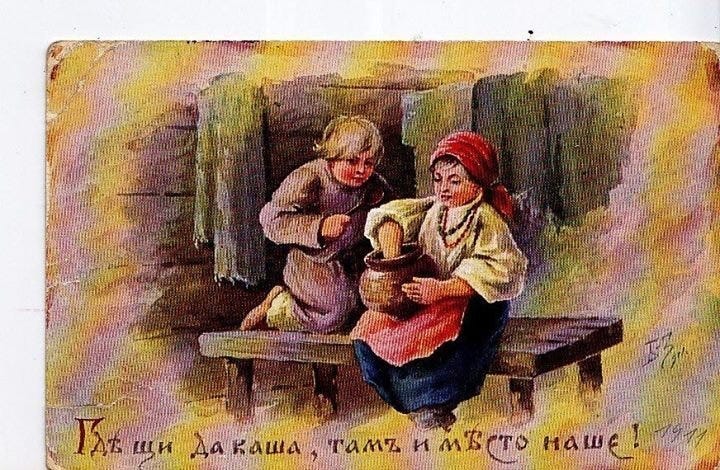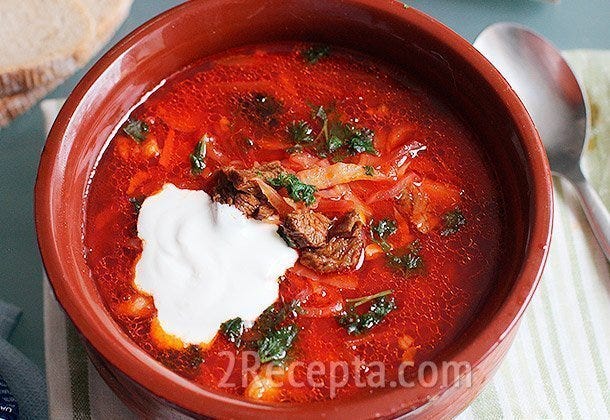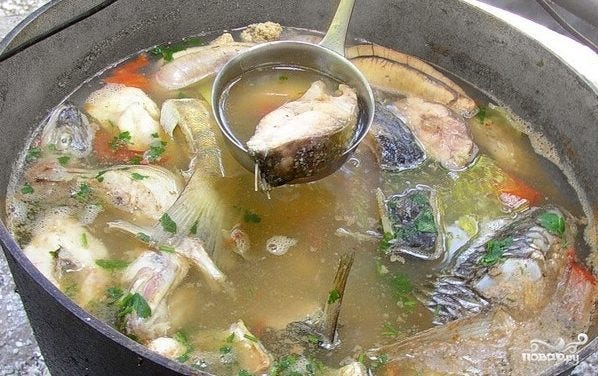I am starting a series of "Russia Explaining" posts which will deal with the cultural and social quirks of Russian-speakers for the benefit of my curious Western audience. To be sure, Russia Explaining is a bottomless rabbit hole, so I am making no promises as to the comprehensiveness of this exercise, but I will deliver the best product I can based entirely on my personal knowledge and experiences.
Which is why I will focus my efforts largely on food, because: a) let’s face it, this is all we really want to know about most foreign cultures, and b) it really is a great vehicle for expanding into weightier cultural and historical topics.
Among the multitude of Russian/Soviet stereotypes that need to be debunked, the one about there not really being any national cuisine to speak of is in the most urgent need of debunking. It was probably created in the Soviet era, during food shortages, when immigrants of my generation would come here, get their minds blown the hell away by the very concept of pizza and tell the locals in their best Yakov Smirnoff voice that "in Soviet Russia, food eat you!"
In fact, the food culture of Russia and neighboring states is extremely rich, quite varied and, obviously, relentlessly weird. Of all the things we Soviet-born folks think we have the right to feel superior to Americans about, food probably ranks right at the top, if only because, judging by the Facebook ads, a typical American recipe goes like this: "Open a can of brand-name crap, roll in crushed Cheetos, bake." Our grandmas, of course, would never lower themselves to calling anything not made from scratch an actual recipe. In babushka's kitchen, there are no shortcuts to greatness. She didn't survive the Holodomor and Khrushchev's "corn revolution" to teach you how to heat up a goddamn can of Campbell's.
One stereotype that is definitely true of Soviet cuisine is that it tends to be a little short on spice. Make that "a lot short", actually, particularly when it comes to Russian dishes, as most Russians are morbidly scared of anything more potent than a pinch of garlic. It is their most jealously guarded military secret that if America ever does attempt to conquer Russia, all it will ever need to bring them to their knees is pepper spray. When ketchup first became available in the Soviet Union, it was advertised as "a spicy American condiment." More on this in a later post. This is why any heat you find in a Russian meal will invariably be an ethnic borrowing from Ukraine, the Caucasus or Central Asia. The only truly Russian seasonings are salt and cigarettes.
That digression aside, let's dive into the world of Russian and Soviet food.
But first, a little
Historical Note
For most of the items in this series, "Russian" will actually mean "Soviet", both because this is the culture I am most intimately familiar with and because Soviet-era food is still very prevalent and even dominant in today's Russia. Yes, the days of the food shortages are over, and the younger generation is as discerning a connoisseur of sushi, gourmet hamburgers and craft beer as any one of you, but traditional dishes are still an enormous part of national and cultural self-identification for most of the country. And "traditional" almost invariably means "Soviet", since the Bolshevik Revolution had largely swept away most vestiges of old imperial Russia, including its high-brow food scene.
When reading, for instance, Anton Chekhov as a schoolboy, I and most of my peers would flatly not understand what exactly the characters in the Russian classical literature were shoving down their maws. Something like sterlyad, a fancy type of fish greatly prized by Czarist Russians, would read like an elaborate curse word to us. As the Soviet system destroyed the enormous wealth and culture gap between the "two Russias", both haute cuisine of the pre-revolutionary upper crust and the rustic fixings of the Russian peasantry were leveled out and transformed into new, egalitarian Soviet grub.
But we never let the lack of variance in our bank of ingredients or the radical change in societal and cultural realities stop us. Soviet ingenuity and the ability to make do with the bare minimum are legendary and, as is true in most cases around the world, essential in making of great cuisine. What follows is but a short summary of what exactly has kept them alive on the country's ongoing crazy quest for whatever the hell.
So, honoring the fact that the first course in any Soviet meal was always a hot liquid of some sort, we are going with soups as the topic of the first entry.
I will start with the unquestioned King of Russian Foods.
Borscht
Yes, I am aware of the irony. The king of Russian foods is actually Ukrainian, a delicious little piece of reverse colonization, especially considering the current state of relations between the two countries. It's not that Russians don't have their own traditional hearty soup. They do, and it's called schi, which is made of boiled cabbage, the Motherland's tears and your children's wishes for a better family.
Schi is very traditional, extremely ancient, quintessentially and unmistakably Russian and tastes exactly as you would expect of cabbage that's been morosely boiling for hours amid tyranny and despair. For a more adventurous mood there exists a variant called sour schi, which is made of pickled cabbage and once and for all answers the question, "How could you guys just sit and tolerate Stalin for all those years?" A Russian colloquialism "a professor of sour schi" refers to a person of an outsized ego and little actual worth. In modern-day Russian, schi is also a slang word for "face" or "mug", presumably deriving from the phrase "making a sour face", which is the face you will most definitely make coming into even distant olfactory contact with the dish.
Schi was an integral part of Russian soldiers' daily ration, which had presumably kept them motivated to conquer new lands, outside of schi's sphere of influence. It is the Dostoyevsky of soups: irrational, self-hating, more than a little anti-Semitic.
Ukrainians, of course, have developed their own, much better, version of schi - kapustnyak, a much richer soup where sauerkraut plays the first violin, but eggs, sour cream, beef and spices are providing a killer supporting cast, leaving schi’s squeaky funeral march in the dust.
However, it is Ukraine's vivacious, arrogant, garish borscht has all but exiled schi from Russia's kitchens. Borscht is so ubiquitous and so beloved, it has now become shorthand for "a homemade meal" and an indicator of a Russian wife's one all-conquering redeeming quality (as in "At least she makes a good borscht"). It is, in short, the King.
Americans' well-documented hatred of beets is quite sad in its own right but it is downright tragic when you consider that it prevents them from enjoying borscht. It is also rather incomprehensible, considering that beets are simply root vegetables with a sweet taste, and Yanks have nothing against carrots or sweet potatoes. We'll have to blame the discrimination of the beet on its crimson color and the Red Scare. As usual, racism and political polarization prove to be deep-seated issues in this country.
There are zero things to not love about borscht. It is a soup that gets fried first, for heaven's sake! Beets, onions and carrots, with a bit of tomato, all finely diced, are sautéed, preferably in lard if you like to go all-Ukrainian hardcore, and only then added to beef stock (chicken is also OK) with potatoes and cabbage already boiling in it.

Other ingredients are left to your own taste and imagination, but a dollop of sour cream for garnish and a nice pinch of black pepper are a must. The sour cream mitigates the beets' sweetness and adds richness to the soup while the pepper provides both the essential spice and the no-less-essential fuck you to Russia's bleak history.
It is also absolutely imperative to serve borscht hot and right off the stove. Wherever the hell you guys got the idea that borscht is consumed chilled, these were probably the same people who sold you on trickle-down economics. Ukrainians, justifiably alarmed by Russia's appropriation of their national soup, love to claim that the "neighbor to the north" consumes borscht that is criminally thin by virtue of not having enough lard in it. "In a real borscht, the spoon should stand up on its own", say defiant Ukrainians with their traditional pride, assertiveness and hatred for cardiovascular health.
Years ago, when my now-adult son was celebrating his 12th birthday, his one wish was to do a father-son birthday project in the kitchen and he chose borscht. The fact that it is decidedly not birthday food (although Ukrainians would probably claim that their version should be able to hold the candles) did not stop him. We prepped the ingredients, made the zazharka (the sauteed base) and spent about an hour and a half bonding unforgettably over a shared masterpiece. The result was spectacular, of course, as any borscht prepared with love and cooperation.
Which is the exact point of this soup, really. Borscht, whether thin or thick, is heavenly precisely due to the beautiful symphony created by the concatenation of sweet, savory and sour flavors of its ingredients. It is the seamless cooperation and unity of purpose that, in the former Soviet Union, is only possible in the context of borscht. This leaves you to think that, had borscht not been invented, we'd all be witnessing a bloody civil war between beets, cabbage and potatoes which very few of us would be able to escape alive.
Be one with the borscht, comrades! Be one with the borscht.
Ukha
Despite being the undisputed king of food, borscht is by no means the only soup in the Slavic culinary arsenal. Listing them all would take forever, but one certainly deserves a special mention by virtue of being extremely native and quite synonymous with the Russian version of rugged outdoorsmanship.
Rybalka, or fishing, is as sacred a ritual of Russian masculinity as going into the woods and shooting something is for Americans. In fact, there is a famous Russian saying: "What is the difference between fishing and hunting? None! It's all just pour and drink!" Yes, for most Russian males, rybalka is just an excuse to leave town in the company of friends and get fall-down drunk out in the nature, without the pesky wives and police officers to prevent a man's blissful unity with mother Earth.
But even though Russians (or Ukrainians, for that matter) are indeed world experts in drinking, they are tremendously good at fishing as well, whenever they can be bothered to stay sober. The economy of the ancient Rus, the proto-state that is the common ancestor of Russia, Ukraine and Belarus, was in fact almost entirely river-based, and fish towers over meat in Slavic Soviet cuisine and always has. They have forgotten more about cold-smoking mackerel than you will ever know about rap music, and dried Caspian roach is the lynchpin of the traditional Russian beer scene. I am not quite sure there isn't an epic poem written entirely about carp, which is delicious, and shame on you, America, for the disdain you treat it with.
But the essence of the rybalka culture is, without a doubt, ukha, the quickest and most rustic dish that can be whipped up while out on the water. Ukha is, to put it simply, fish soup. But let's not put it simply, because it is also so much more.
The name itself, which is of ancient Indo-European origin and cognate with the English "juice", simply means "liquid" or "broth" and originally meant any type of soup. The fact that it came to be associated exclusively with fish just goes to further make the case for rybalka (and the accompanying lack of sobriety) as a nation-building exercise.
Ukha isn't, technically, a soup but rather concentrated fish broth and, unlike with borscht, where a clearly defined authority (whatever the Ukrainian countryside says) exists, there are hot disputes in Russia about what constitutes "proper ukha." In particular, there is no agreement over whether it is permissible to use only one or several types of fish simultaneously. But everyone agrees that only very fresh fish (or even live one, straight out of the river and into the pot) must be used, and sander, ruffe and river perch are universally recognized as classical ukha fish.
Whichever faction the ukha craftsman belongs to, his product better have a thick, somewhat glue-like broth, not smell too fishy and have juicy, well-textured fish still full of its unique flavor floating inside. The fish is added to a vegetable stock that is already almost done (since overcooking fish is a crime against the very soul of the Motherland, timing is the key here) and consists of onions, potatoes and carrots. A mix of Russian herbs is absolutely essential (don't you even think of skipping on the dill or the bayleaf) and black pepper is indispensable, but adding the seasonings is an absolute art form, because they can easily destroy the precious fish flavor.
A typical outdoors ukha, though, will invariably be a much simpler dish, with few or no vegetables and whatever fish is readily available. It is also not uncommon to pour vodka into the pot, just to add flavor and get rid of the smell of river muck.
Finally, as should be abundantly clear by now, Russia's great gender divide is eloquently underscored in its soup culture. While the borscht is decidedly a female soup (requiring patience, organization and a happy outlook on life), ukha, in all its ruggedness and directness, is unambiguously male.
Leave it to Russians to make everything about patriarchy.
Join me soon for part two, in which I explore the Soviet Union’s bizarre love affair with the most bland of all French condiments.






